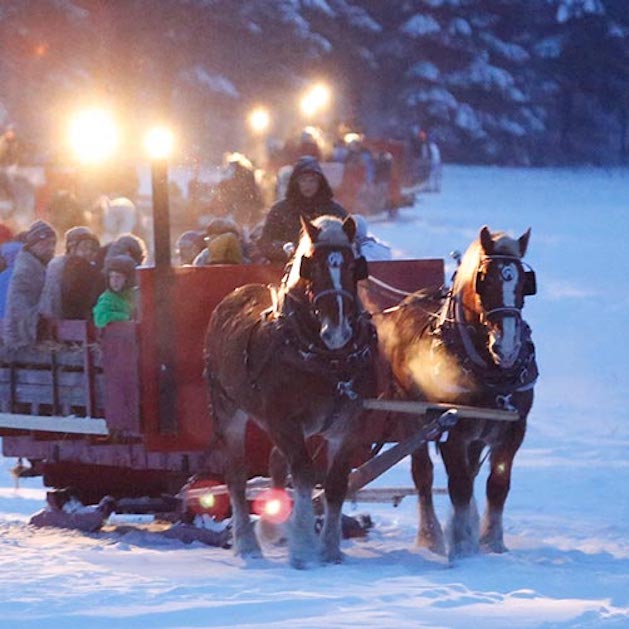
This part of the Caravan experience is still great.
The Wonderful is not wonderful.
You can’t beat the venue, but Luke Reece’s script is bad.
A riff on the 1946 movie It’s a Wonderful Life, The Wonderful is Caravan Farm Theatre’s winter show. That means it takes place outdoors on a farm near Armstrong in the north Okanagan. Members of the audience hop onto horse-drawn sleighs and glide through the snowy night to watch scenes that unfold on little stages set up in the woods. So far so gorgeous.
The Caravan member who was riding shotgun (keeping watch) on the back of my sleigh was terrific — firm but extremely amiable when he was dealing with a kind of out-of-control little guy who was sitting next to me. And the drivers of the sleighs guided their teams of Percherons into tight spots with incredible precision.
But, as I said, the script sucks. George Bailey (Jimmy Stewart’s character in the movie) becomes Georgia Brathwaite, a young Black woman living in a small BC community. She’s about to commit suicide. To convince Georgia to embrace her life, Terence, this version’s angel, shows her what her little town would have been like if she had never been born.
Not one of Reece’s variations on the suicide/redemption plot works.
In the movie, George has an impact on the town of Bedford Falls because he takes action: he does specific, difficult, good things. As a youngster, he saved his little brother from drowning and stopped the drunken pharmacist from giving poison to a sick child. As an adult, he is a housing activist: as the head of Bailey Bros. Building and Loan, he provides financing so that the town’s ghettoized poor can step out of poverty and into secure and dignified accommodation. People tend to overlook this, but It’s a Wonderful Life, is fervently anti-capitalist — and it addresses the evils of capitalism in narratively potent ways: George’s nemesis is the rich Mr. Potter, who’s buying up the town and whose only motivations are profit and status. George opposes Potter every step of the way until Potter hatches a plan that drives George to the point where he wants to take his own life. To convince George to live, Clarence, the movie angel, shows him the impact of his humble but concrete and courageous actions.
What impact has Georgia had on her community? Well, it turns out that, if Georgia had never existed in her little town, all of the white people, including the guy who became her boyfriend in real life, would have been racist. How did Georgia stop this from happening? As a little girl, when she encountered racism, she rubbed her hands together and radiated warmth.
There is so much wrong with this, but surely the most egregious problem is that Reece has made this little Black girl solely responsible for addressing racism in her community. Georgia’s mom still lives in the town and her dad did lived there too, but apparently, neither of them had any impact, and none of the white people — who are all inherently racist — are expected to do any of the work. Near the end of the show, the other characters say they need to give Georgia more support, but that’s not the lesson the action of the play is teaching. And Georgia’s solution — magical niceness — is pathetic.
Georgia’s motivation for suicide also feels weak: a sculptor, she feels overshadowed by legacy of her deceased dad, who was also an artist. Oh yeah? Well, George’s business might collapse through no fault of his own, he may go to prison, and his customers, whom he has worked so hard to defend, may be plunged back into penury. Yes, despair has many faces. And, when you’re telling a story, it’s a good idea to create compelling and accessible stakes.
Within the movie’s consideration of capitalism, George has a clear and present antagonist in Mr. Potter. Georgia’s antagonist seems to be … Prince Rupert, a very dead and very distant embodiment of colonialism and racism. Price Rupert’s statue has been removed from the town and Georgia has created an alternative monument — but none of this significantly effects the action. Yes, historical racism casts a long shadow. Yes, monuments — and their potential removal — are important. But, in terms of storytelling, an antagonist who’s actually in the story can be very helpful.
None of these narrative weaknesses can be explained away by the argument that The Wonderful is more of a fairy tale than the film. Fairy tales need structure, too.
How’s the production? As Georgia, Helen Belay overacts. Marcia Johnson, who’s playing Jasmine, Georgia’s mom, is more subtly effective, and Kano Mac Wilkinson is charmingly effervescent as the angel Terence — and he does a nice job of wrapping his tongue around Reece’s poetry. Everybody else is fine although acting styles vary throughout the cast.
I usually love going to the Caravan Farm. This time, I loved the bonfires and the hot chocolate and the sleigh ride. But the show itself was hugely disappointing.
THE WONDERFUL Written and directed by Luke Reece. A Caravan Farm Theatre production at the Caravan Farm outside Armstrong on Friday, December 10. Continues until December 31. Tickets and information
NEVER MISS A REVIEW: Sign up for FRESH SHEET, my weekly e-letter about the arts.
And, if you want to help to keep independent arts criticism alive in Vancouver, check out my Patreon page.





0 Comments